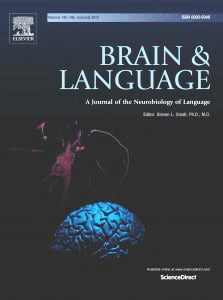Dissertation Award
Jin Wang

 The Society for the Neurobiology of Language is pleased to announce the 2022 Dissertation Award recipient: Jin Wang
The Society for the Neurobiology of Language is pleased to announce the 2022 Dissertation Award recipient: Jin Wang
The Dissertation Award is generously sponsored by Brain and Language.
The longitudinal relation between the neural basis of phonological awareness and reading skill in developing children
Friday, October 7, 2022, 3:00 - 3:45 pm EDT, Regency Ballroom
Chair: Sharon Thompson-Schill, University of Pennsylvania
Speaker: Jin Wang, Department of Psychology and Human Development, Vanderbilt University; Graduate School of Education, Harvard University
Brain and Language Dissertation Article
Reading is an essential skill for daily life and academic success. According to the connectionist model of reading, word recognition involves orthographic, phonological, and semantic processing, as well as the interactions among them. Language skill such as phonological processing, develops earlier than reading acquisition, and thus likely serves as a foundation for later reading development. We refer to this hypothesis as the scaffolding hypothesis. In addition, based on the connectionist model, the experience of learning to read changes the nature of spoken language processes, which we refer to as the sculpting hypothesis. The overarching goal of my dissertation was to use a language skill, phonological awareness, and its longitudinal relation to reading skill, to examine how the processes of scaffolding and sculpting unfold in elementary school children from 5- to 7- to 9-year-olds. The specific aims of my dissertation were to determine whether the development of these processes depend on (1) the grain size of the representations including larger units like rhymes/rimes versus smaller units like phonemes/letters, (2) the mapping from phonology to orthography resulting in automatic orthographic activation during spoken language processing, and (3) the nature of phonological processing involving representations versus access to those representations. As is predicted by the connectionist model that developmental effects should be earlier for smaller compared to larger grain sizes, due to greater computational demands of the latter, we found that the scaffolding effects occurred at small grain sizes in younger children but at larger grain sizes in older children. In addition, we found that in younger children, better reading led to an increase of the mapping from phonology to orthography and that automatic orthographic activation during auditory processing scaffolded later reading acquisition, consistent with the connectionist model. Finally, we found that phonological representation played a role in the scaffolding and sculpting effects earlier than phonological access, suggesting that a critical component is missing in the connectionist model, which only includes phonological representations but no control systems to account for the role of phonological access.
About Jin Wang
Jin Wang completed her PhD in Psychological Sciences at Vanderbilt University in March 2022. She moved in June 2022 to join the Harvard Graduate School of Education as a post-doctoral scholar.
In her dissertation, Jin Wang systematically examined the bidirectional relation between the neural basis of phonological awareness and reading skill in developing children. This work addresses a critical debate in the literature about whether deficits in phonological awareness are the causes or consequences of reading difficulties. By using a cross-lagged panel design, neural measurements, and linked connectionist models of reading, her studies provide convincing evidence supporting a reciprocal relation between the two skills, that evolves and shifts across the developmental time course. In addition to numerous publications related to neural specialization of language development, Dr. Wang has already published five papers from her doctoral studies and more to come in leading journals spanning the field of neuroimaging, developmental cognitive neuroscience and psycholinguistics.
